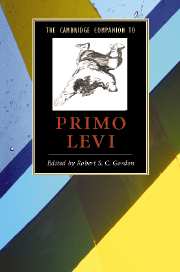10 - Primo Levi and translation
from Part IV: - Language and Literature
Published online by Cambridge University Press: 28 November 2007
Summary
Early on in the 1984 book-length dialogue between astrophysicist Tullio Regge and concentration-camp survivor and chemist Primo Levi, Regge mentions his interest in comparing the Hebrew and Italian versions of the Bible. Levi is immediately struck: 'is your passion born from a linguistic, philological interest, or from something else?' (Conversations, p. 3). This opening talk is, surprisingly, not about science, which was the intended topic of their dialogue, nor even about Levi's experiences in Auschwitz-Monowitz, but rather about problems of translation, between Hebrew, Greek and Italian, and interpretation of the Bible, from Dante to the Talmud. Levi's perceptive observations about the intricacies of Bible translation and interpretation (a topic that lies at the core and historical origin of translation studies) reminds us that translation was not only a trade he practised, but also a subject he studied and thought about in some depth, part of a large, intense interest in language and language systems in general terms. The conversation with Regge continually navigates between linguistics, etymology and translation (among other topics) and this pattern can be observed throughout his many interviews as well as his own written work.
While Levi's career as a scientist and writer and his experience as a writersurvivor have been well documented, his rich and varied career as a translator has remained largely unknown and unanalysed. Levi translated parts of a four-volume chemistry textbook in the 1950s, works of anthropology by Mary Douglas and Claude Léi-Strauss, Holocaust narratives, poetry by Heine and Rudyard Kipling and several diverse fragments of novels, works of history and science for his own anthology, The Search for Roots (La ricerca delle radici, 1981).
- Type
- Chapter
- Information
- The Cambridge Companion to Primo Levi , pp. 155 - 170Publisher: Cambridge University PressPrint publication year: 2007
- 4
- Cited by



